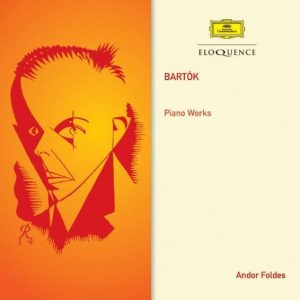Andor Foldes (piano)
Eloquence DGG 480 7100 (4CDs)
TPT: 212’ 06”
reviewed by Neville Cohn
In the 1950s, South Africa was very far from the main highways of the international concert circuit. So, when Andor Foldes arrived to give concerts in Johannesburg and Cape Town, it was a visit of considerable consequence. His African itinerary began as far north as Kenya and then, travelling ever southwards, there were concerts as well in Southern Rhodesia (now Zimbabwe) – in Bulawayo and then-Salisbury – and then the Union of South Africa (as it was then known).
 Foldes played concertos with orchestras in Johannesburg and Cape Town – and the works he performed were mainstream – Mozart and Beethoven. But there was another, very significant, arrow to Foldes’ bow.
Foldes played concertos with orchestras in Johannesburg and Cape Town – and the works he performed were mainstream – Mozart and Beethoven. But there was another, very significant, arrow to Foldes’ bow.
He’d studied with Bartok and was a passionate advocate for his compatriot’s music, specially that written for piano.
In Cape Town, apart from his work with orchestra, Foldes met, and played for, members of the South African Society of Music Teachers (SASMT). Much of Foldes’ repertoire was by Bartok which in those days was considered ultra-modern – and its performers very daring. Those piano teachers who’d attended that meeting and listened to Foldes at the keyboard were agog; it was a startling, completely new sound- and mood-world which Foldes revealed.
Its complex rhythmic patterns – and unusual and sometimes grating dissonances – triggered gasps of astonishment (I was told later). The sonic and stylistic Bartokian world that Foldes revealed at that long-ago performance was so unexpected, so startling, even shocking, that it made an indelible impression on those present.
If Foldes’ intention was to carry the flag for his compatriot, it was an immensely
effective way to do so.
Within weeks of his visit, a shipment of some of Bartok’s piano scores (brought by Union Castle Line steamers which plied weekly between Cape Town and Southampton) arrived. Far and away the most popular of these works was Bartok’s Five Rumanian Dances. To this day in South Africa, it’s very often heard in local eisteddfodau.
Foldes’ keyboard wizardry is abundantly present in an Eloquence 4-CD pack. It’s on compact discs for the first time. It is one of most significant and worthwhile re-issues of earlier recordings in the Eloquence series.
He does wonders with the material; his recordings have the stamp of the highest authority, a magnificent tribute to the composer’s genius – and one of his chief interpreter’s most significant offerings.
Foldes plays Bartok’s Out of Doors suite with an understanding of style and mood which totally engages the listener. (This was a particular favourite of the composer who frequently played it when stressed by health or financial problems. It brought him an inner peace.)
Much the same can be said of just about everything in this collection. Fifteen Hungarian Peasant Songs is pure delight as is a confrontingly muscular account of Allegro barbaro.

